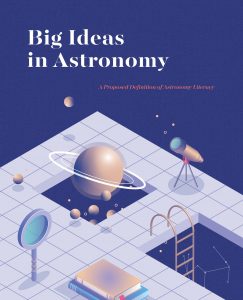Big Ideas in Astronomy

This is the motto of the International Astronomical Union (IAU) Office for Astronomy Outreach. If “All” is a very vast term to define society and its communities, “Astronomy” as a body of knowledge is also similarly vast. This project, “Big Ideas in Astronomy”, explores the issue: “What should science-educated citizens know about astronomy?”
As a result of several discussions, meetings, workshops, presentations, telecoms and text interactions in this document we propose a set of Big Ideas in Astronomy, a Roadmap to Astronomy Literacy Goals. This document establishes the “Big Ideas” and supporting concepts that all citizens on our planet should know about astronomy.
Big Ideas in Astronomy builds on the pioneering American Association for the Advancement of Science (AAAS) Project 2061. The AAAS Project 2061 started in 1986, the year Halley’s Comet passed near Earth. The AAAS was intrigued by what affects children’s connection to the natural world — who were starting school then will see the return of the Comet. What scientific and technological changes will they also see in their lifetime? How can education prepare them to make sense of how the world works; to think critically and independently; and to lead interesting, responsible, and productive lives in a culture increasingly shaped by science and technology? Big Ideas in Astronomy also expands on the work developed by other scientific disciplines and projects, namely: Climate Science Literacy, Earth Science Literacy Principles, Ocean Literacy and Big Ideas of Science.
Big Ideas in Astronomy presents eleven Big Ideas and expands on them through sub-ideas and additional information. This document is designed with educators and astronomers in mind, it is a guiding document to decide which topics they should address in their teaching, training sessions, outreach activities or resources development. However, this needs to be a dynamic document, and we welcome comments and remarks from the astronomy community, the astronomy education community and the science education community.
Clique aqui para acessar o livro
Summary:
Astronomy is one of the oldest sciences in human history
Astronomical phenomena can be experienced in our daily lives
The night sky is rich and dynamic
Astronomy is a science that studies celestial objects and phenomena in the Universe
Astronomy benefits from stimulates technology development
Cosmology is the science of exploring the Universe as a whole
We all live on a small planet within the Solar System
We are all made of stardust
There are hundreds of billion of galaxies in the Universe
We may not be alone in the Universe
We must preseve Earth, our only home in the Universe
Authors: João Retrê, Pedro Russo, Hyunju Lee, Eduardo Penteado, Saeed Salimpour, Michael Fitzgerald, Jaya Ramchandani, Markus Pôssel, Cecilia Scorza, Lars Lindberg Christensen, Erik Arends, Stephen Pompea, Wouter Schrier







